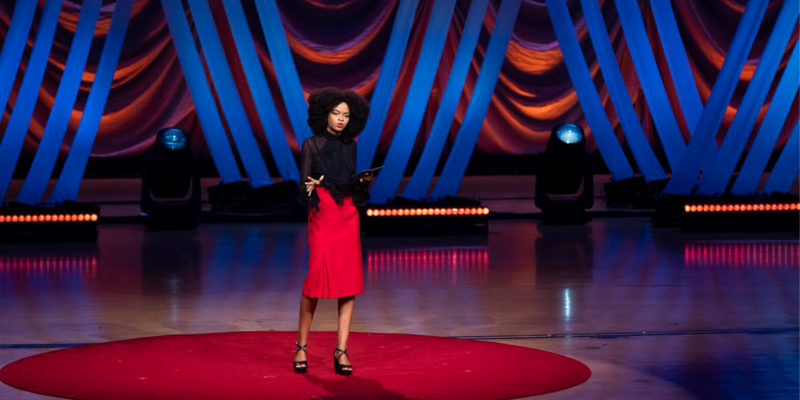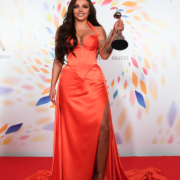During TEDWomen 2023 in her hometown of Atlanta, GA, AFROTECH spent time learning more about where it all started for Penn, who is the CEO of her own company, a three-time TED talker, and a visionary using her love for animation in the film and television industries as well.
For the young mogul and activist, being in control of her decision-making as a businesswoman has proven to be a way for her to advance and grow as a person. Now, she’s changing the world one sustainable practice at a time.
How It All Started
“Maya’s Ideas is an award-winning global sustainable fashion brand,” Penn said. “We also have a number of celebrity clientele to focus, specifically, on the process of creating these designs.”
The sustainable fashion brand, which she launched in 2008 at the age of 8, carries items created from either organic, recycled or vintage materials.
“So, that can mean a lot,” she said. “Because the way that we designed for circular fashion especially, is kind of working backward. We’re sourcing the actual material in the textile itself, oftentimes finding vintage materials or fabric, you know, lots of gorgeous remnant fabrics that would otherwise be thrown away or end up in a landfill.”
Luckily, thanks to Maya’s Ideas, the materials become artwork for other designs.
The Evolution Of Sustainable Fashion
“Technology is a huge component for enabling more sustainable practices within the fashion industry,” Penn added. “There are a lot of examples of this. Well, biomimicry is one and how, basically, looking at systems in nature and what we as human beings can learn from just the natural intelligence of plants, of animals, of ecosystems, and apply that to what we design and the solution that we create to a number of different problems.”
What’s more, things like IoT, which Penn explained stands for “Internet of Things,” is a type of technology used by fashion retailers today to help them track the life cycle of a product, where it ends up, and enable recycling to make sure the product can be used to create something completely different at the end of its lifespan.
“Instead of going through what’s traditionally called a cradle to grave model, having a cradle to cradle model, so that [the product] has another life and it doesn’t just end up being thrown away when there’s still so many resources that can be used from that item,” said Penn.
Why Large Fashion Brands Struggle With Sustainability
According to Penn, the current fashion industry as the world knows it isn’t prioritizing sustainability, which is why larger companies often have problems when it comes to cultivating eco-friendly items.
“Traditionally, the fashion industry has been built on profit, and it’s built on literally just how much money can be made,” said Penn. “The reason why we have fast fashion and clothing that is designed to literally fall apart after 10 wears and this culture that has been created by the fashion industry around disposability, around trends, and what’s in and out of season and creating a fear of missing out and having to constantly buy new things, all of that is very strategically manufactured.”
As a result, Penn also says that there’s a large disconnect between people and where their clothes come from.
Being A Part Of The Solution
As she looks ahead to 2024, Penn’s mission remains the same — to change the landscape of the fashion industry.
“Environmental justice is one of the most important keys to facing systemic oppression and ending systemic oppression for Black people around the world and for people of color and indigenous communities around the world,” Penn explained to AFROTECH. “Because environmental racism is something that so many communities here in the U.S. and across the globe face, our communities are more likely to experience air, water, and soil pollution, illegal dumping of toxic materials, and so forth.”
She continued, “The fashion industry is a huge contributor to various environmental injustices around the world, so that’s why it’s very important to me in my work. There are a number of different projects that I’m working on with Maya’s Ideas, but one of them is creating some new designs for my environmental animated short film, ‘ASALI: Power of The Pollinators,’ because any sort of like merch or t-shirts of these animated characters has to be sustainable and circular and really innovative and fun. That’s really important to me so of course, I’m going to be doing a lot of those designs.”
Click here to learn more about Maya Penn and her work through Maya’s Ideas.











Comments